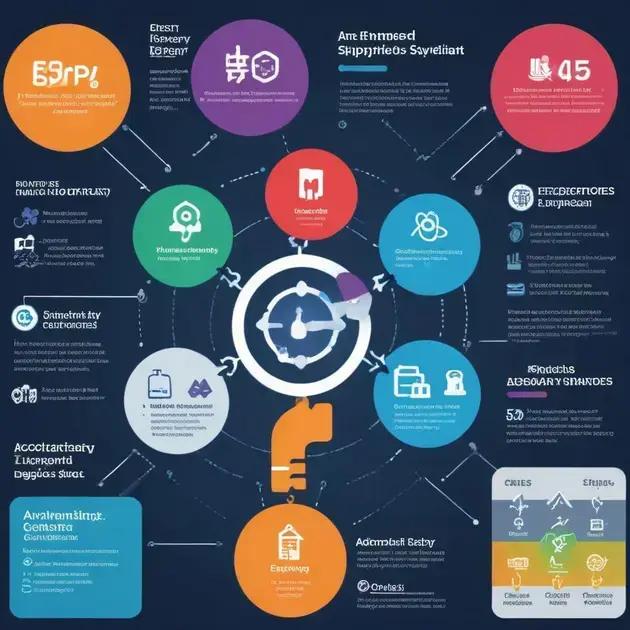In the fast-paced world of business, ERP automation is emerging as a game-changer for many companies. It eliminates tedious manual work, diminishes errors, and significantly boosts operational efficiency. Unlike traditional ERP systems that rely heavily on human input, automation streamlines workflows, enabling businesses to thrive while saving time and resources. With 47% of manufacturers showing interest in ERP software, it’s clear that the landscape is shifting towards recognizing the undeniable advantages of automation.
Understanding ERP Automation
Understanding ERP Automation involves recognizing how technology can simplify business processes. ERP stands for Enterprise Resource Planning. It integrates various functions into one complete system to streamline processes and information across the organization.
ERP automation is all about using technology to minimize the need for manual input. This can lead to faster workflows and reduce the chances of errors. Businesses can automate repetitive tasks such as:
- Data entry
- Inventory management
- Report generation
- Order processing
By reducing manual tasks, companies can ensure accuracy and save time. Employees can focus on more important work like analyzing data and making strategic decisions. Automated systems also provide real-time data, which enhances decision-making processes.
Key Features of ERP Automation
Some of the key features of ERP automation include:
- Integration: Connecting various departments to work cohesively.
- Scalability: Easily adjust systems to accommodate growth.
- Cloud-based solutions: Access ERP from anywhere.
- Data Analytics: Analyze data for better insights and decision-making.
By understanding these features, businesses can better evaluate how ERP automation can fit into their operations.
Key Benefits of Automation

Key Benefits of Automation in ERP systems are essential for companies looking to improve their workflows. Automation brings efficiency, accuracy, and consistency to various tasks within an organization. Here are some notable benefits:
1. Increased Efficiency
Automation speeds up tasks that usually take a lot of time if done manually. With automated processes:
- Orders are processed faster.
- Reports are generated instantly.
- Data updates occur in real-time.
This allows employees to focus on other important activities, improving overall productivity.
2. Enhanced Accuracy
Human errors can happen, especially in repetitive tasks. Automation reduces these errors significantly. For example:
- Data entry mistakes are minimized.
- Calculations are performed accurately.
- Reports reflect precise figures without discrepancies.
These improvements lead to better decision-making since data is trustworthy.
3. Cost Savings
With automation, businesses can save money by:
- Reducing labor costs for manual tasks.
- Lowering the costs of errors.
- Increasing operational efficiency that boosts profit margins.
Investing in automation can lead to a quick return on investment (ROI).
4. Better Compliance
Automated systems can help businesses meet industry regulations and standards. They do this by:
- Maintaining accurate records of transactions.
- Providing reporting features for audits.
- Streamlining compliance processes.
This reduces legal risks and ensures the business operates within the law.
How Automation Reduces Errors
How Automation Reduces Errors is a crucial aspect of ERP systems. When tasks are automated, the likelihood of mistakes drops significantly. Here are some key points to understand how this occurs:
1. Standardization of Processes
Automation establishes consistent workflows. When everyone follows the same steps, it leads to:
- Fewer misunderstandings among team members.
- Reduced variations in output.
- Clear guidelines for operations.
This standardization helps maintain high quality, ensuring that every task is done correctly.
2. Real-Time Data Entry
In manual systems, data entry errors are common. Automation allows for:
- Instant input: Information is entered directly into the system.
- Validation checks: System checks can confirm that data is accurate before submission.
- Elimination of duplicates: Automation can prevent data from being entered multiple times.
This decrease in manual input leads to fewer errors in records.
3. Automated Notifications
With automation, businesses receive alerts for various actions. For example:
- Notifications for missing information.
- Alerts for tasks that need attention.
- Reminders for due dates or renewals.
These notifications keep tasks on track and reduce the chances of overlooking critical deadlines or requirements.
4. Comprehensive Reporting
Automation provides detailed reports that are accurate and timely. Benefits include:
- Real-time insights: Access to the latest data eliminates outdated information.
- Error reduction: Automated calculations minimize errors in financial reporting.
- Easy audits: Complete records simplify the auditing process.
Businesses can use these reports to quickly address any discrepancies, improving overall accuracy.
Real-Time Insights for Better Decision Making

Real-Time Insights for Better Decision Making are among the most valuable advantages of implementing ERP automation. Access to current data helps businesses make informed decisions quickly. Here are several ways real-time insights can enhance decision-making:
1. Instant Access to Data
With automated systems, data is instantly updated and accessible. This allows for:
- Timely responses: Managers can react immediately to market changes.
- Informed strategies: Decisions are based on the latest information rather than outdated reports.
- Reduced delays: Quick access eliminates waiting for reports to be generated.
2. Enhanced Forecasting
Real-time data supports better forecasting techniques. Businesses can:
- Analyze trends as they happen.
- Adjust inventory levels based on current sales data.
- Make proactive changes to business strategies to meet market demands.
3. Improved Collaboration
With shared real-time data, teams can work together more effectively. Benefits include:
- Transparency: Everyone has access to the same information.
- Enhanced teamwork: Departments can align their goals based on up-to-date data.
- Fewer misunderstandings: Real-time updates reduce confusion between teams.
4. Data-Driven Decisions
Automation allows leaders to make decisions backed by data analysis. This approach leads to:
- Increased accuracy: More reliable conclusions can be drawn from current data.
- Strategic insights: Identifying profitable areas for growth becomes easier.
- Mitigated risks: Real-time insights help identify potential issues before they escalate.
By utilizing real-time insights, organizations enhance their agility and responsiveness to changes in the business environment.
Industries Benefiting Most from ERP Automation
Industries Benefiting Most from ERP Automation are diverse, as many sectors can enhance their operations through automation. Each industry experiences unique advantages when adopting ERP systems. Here are some of the industries that gain the most from ERP automation:
1. Manufacturing
Manufacturers utilize ERP automation to streamline production processes. Key benefits include:
- Improved inventory management: Track raw materials and finished goods in real-time.
- Efficient production scheduling: Automatically align production schedules with demand.
- Reduced wastage: Monitor materials to minimize excessive use.
2. Retail
The retail industry benefits from ERP automation in several ways:
- Real-time inventory tracking: Know what items are in stock and what needs to be reordered.
- Enhanced customer insights: Analyze buying patterns to tailor marketing efforts.
- Streamlined supply chain: Optimize logistics for faster deliveries.
3. Healthcare
In healthcare, automation is crucial for managing patient data and resources. Benefits include:
- Accurate patient records: Maintain up-to-date information for better care.
- Efficient billing processes: Automate billing to reduce errors and speed up collections.
- Resource management: Schedule staff and equipment effectively.
4. Construction
Construction companies leverage ERP automation to enhance project management. Significant advantages are:
- Budget tracking: Monitor project costs in real-time to stay within budget.
- Resource allocation: Ensure the right materials and labor are in place at each site.
- Compliance management: Keep up with regulations and safety standards easily.
5. Professional Services
Industries such as consulting or legal services benefit by:
- Time tracking: Automate tracking billable hours for accurate invoicing.
- Project management: Manage client projects and resources effectively.
- Client relationship management: Keep track of client interactions for better service.




